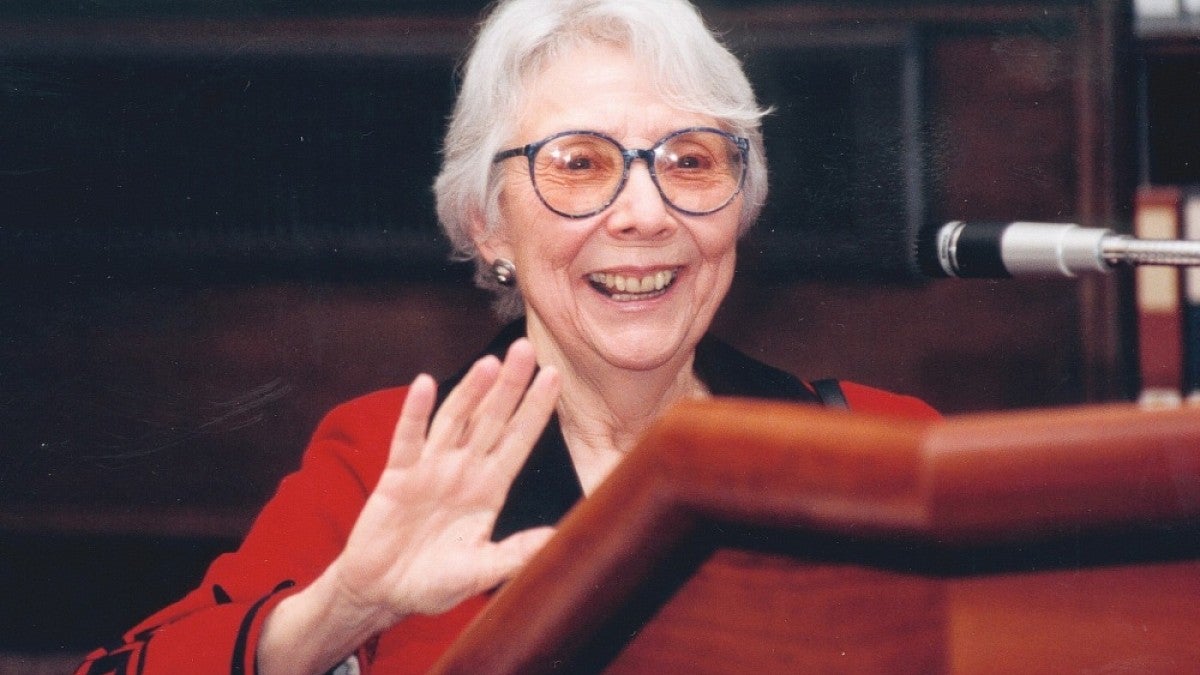Friends and colleagues of Joan Acker, the first female sociology professor at the University of Oregon and leader in the feminist movement, will gather Aug. 27 for a campus remembrance. Acker died June 21 at age 92.
The event will be held in Gerlinger Lounge. The time will be announced closer to the date.
Colleagues said Acker will be remembered for transforming women’s studies on campus, her pioneering scholastic work on gender and class, and her ardent activism to change the political, economic and academic landscape for her gender.
“It is hard to overstate Joan Acker’s impact on feminist scholarship and the University of Oregon,” said Margaret Hallock, former director of the UO Wayne Morse Center for Law and Politics. “She mentored many of us who followed in her scholar-activist footsteps, and we will always remember her brilliant analyses, her sense of humor and her dedication to a better world.”
Born in 1924, Acker began defying societal expectations for women at an early age. During her childhood in Indiana, she bucked then-traditional feminine pastimes to pursue archery and sailing. She later refused to take no for an answer when an institution advised her to not apply for their graduate program because she was “too old” and a woman. Instead, she applied to the UO and earned her doctorate in sociology before joining the faculty in 1967, when less than 3 percent of professors were female.
Over the course of her nearly three decades at the UO, she transformed the landscape for women’s studies on campus by developing courses that examined gender and establishing UO’s Center for the Study of Women in Society, which she directed from 1973 until 1986. She expressed a deep commitment to the “existence of a feminist movement” and mentored many students and colleagues both here and as a visiting scholar at institutions across the globe.
“Joan was a groundbreaking feminist scholar who changed the university through her role as founding director of the Center for the Study of Women in Society, changed sociology through her work on the intersections of gender and class, and changed lives through her teaching, research, activism and friendship,” said Kate Barry, a former student and close friend.
Known for her formidable attitude and sharp candor, Acker was also a passionate activist.
“She could be a feisty person, willing to take on anyone, if the issue was important,” said Don Van Houten, a former sociology colleague and friend of nearly 50 years.
Acker got her first taste of civic engagement when she attended Hunter College in the 1940s and campaigned against the Taft-Hartley Act, which stripped workers of many of the labor rights won through the Wagner Act. She then joined the antiwar movement and championed civil rights while living in New York, before establishing herself as a vocal proponent for women’s rights.
Acker’s passion for activism greatly influenced her research, as she viewed it as a gateway to identifying solutions for the problems faced by women. Through her many publications, she strived to circulate information that would “have theoretical and practical implications that made a difference in people’s lives,” a former student said.
Her books on gender and class include “Doing Comparable Worth: Gender, Class, and Pay Equity”; “Class Questions: Feminist Answers”; and “Stretched Thin: Poor Families, Welfare Work, and Welfare Reform.” She also received numerous accolades and fellowships for her scholarly work, including sociology’s top award, the American Sociological Association Career of Distinguished Scholarship Award.
“As a pathbreaking feminist researcher, Joan Acker showed us that it was possible to combine the personal and the political in pursuit of social justice,” said Scott Coltrane, senior vice president and provost. “Joan Acker's contributions to feminist scholarship and to social activism on behalf of women's rights have been truly inspiring."
—By Emily Halnon, University Communications


